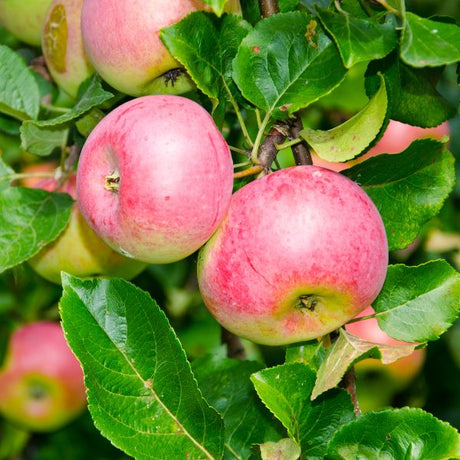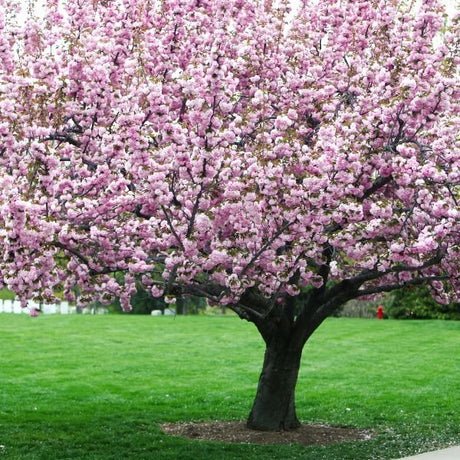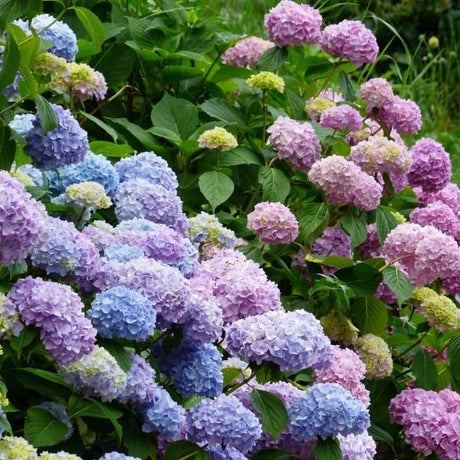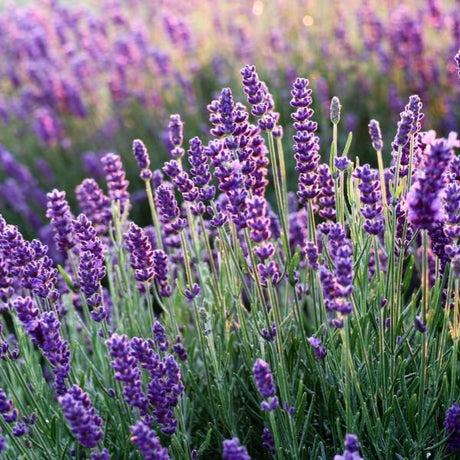Freedom Rose of Sharon
Hibiscus syriacus 'Freedom'
- Stay Protected with Plant Sentry ™
Freedom Rose of Sharon - #3 Container is backordered and will ship as soon as it is back in stock.
Plant Sentry™
Plant Sentry™
Plant Sentry is designed to protect both consumers and the nursery trade from invasive plant pests and diseases. Sites that display the Plant Sentry protection badge are protected from consumers buying and nurseries shipping material carrying invasive pests and diseases.
This proprietary eCommerce software prevents the shipment of a restricted plant to each state. The Plant Sentry system includes a shipment certification program. The Plant Sentry Compliance Officer works closely with NatureHills.com and each nursery or fulfillment center to ensure only compliant plants are sold to customers.
Click Here to learn more

Delivery and Shipping
Delivery and Shipping
Shipping
To obtain a more accurate shipment time-frame, simply enter your zip code in the “Find Your Growing Zone” box to the right. Our plants are grown all over the country and lead time on items may be different because of this. Once your order is placed, you will also receive the specific shipment time-frame information as part of your order confirmation. Once an item ships, you will receive shipment notification and tracking numbers, so you can follow along while your plant travels to your doorstep. We use FedEx, UPS, or USPS at our discretion.
Due to winter weather we have put a hold on shipping to the areas shown below in grey. You can still order now and we will ship the plant to you during an appropriate time for your zone.
Standard Shipping Rates
At Nature Hills we handle, package and ship the products you order with the utmost care to ensure healthy delivery. Shipping and handling charges are calculated based on the tables below. Please note that some items include an additional handling surcharge, these will be noted on the item's product page.
| From | To | S&H |
|---|---|---|
| $0 | $19.99 | $24.99 |
| $20 | $49.99 | $29.99 |
| $50 | $69.99 | $34.99 |
| $70 | $99.99 | $39.99 |
| $100 | $129.99 | $44.99 |
| $130 | $149.99 | $48.99 |
| $150 | $150+ | Approx 28% |
Click here to see our full rates
Understanding Plant Options
Nature Hills offers plants in two main formats:
- Container Plants: Grown in pots with soil, sized by container volume and plant age
- Bare Root Plants: Dormant plants without soil, sized by height measurements
Container Plant Sizes
Container sizes indicate plant age and growing capacity rather than liquid volume equivalents. Our containers follow industry-standard nursery "trade gallon" specifications, which differ from standard liquid gallon measurements.
Young Plants (6 months to 18 months old)
| Container Size | Actual Volume | Metric Equivalent |
|---|---|---|
| 2" x 2" x 3" | 0.18 - 0.21 dry quarts | 0.20 - 0.23 dry liters |
| 4" Container | 0.31 - 0.87 dry quarts | 0.35 - 0.96 dry liters |
| 4.5" Container | 0.65 dry quarts | 0.72 dry liters |
| 6" Container | 1.4 dry quarts | 1.59 dry liters |
| 1 Quart | 1 dry quart | 1.1 dry liters |
| 5.5" Container | 1.89 dry quarts | 2.08 dry liters |
Established Plants (18 months to 2.5 years old)
| Container Size | Actual Volume | Metric Equivalent |
|---|---|---|
| 2 Quart | 2 dry quarts | 2.2 dry liters |
| #1 Container | 2.26 - 3.73 dry quarts | 2.49 - 4.11 dry liters |
| 5" x 5" x 12" | 3.5 - 4.3 dry quarts | 3.85 - 4.74 dry liters |
Mature Plants (2-4 years old)
| Container Size | Actual Volume | Metric Equivalent |
|---|---|---|
| #2 Container | 1.19 - 1.76 dry gallons | 5.24 - 7.75 dry liters |
| #3 Container | 2.15 - 2.76 dry gallons | 8.14 - 12.16 dry liters |
Large Plants (3-5 years old)
| Container Size | Actual Volume | Metric Equivalent |
|---|---|---|
| #5 Container | 2.92 - 4.62 dry gallons | 12.86 - 20.35 dry liters |
| #6 Container | 5.25 - 6.01 dry gallons | 23.12 - 26.42 dry liters |
| #7 Container | 5.98 - 6.53 dry gallons | 26.34 - 28.76 dry liters |
Bare Root Plants
Bare root plants are sold by height from the root system to the top of the plant. Plants may exceed minimum height requirements.
Common Sizes:
- Trees: 1 foot, 2 feet, 3 feet, 4 feet, 5 feet, 6 feet
- Shrubs & Perennials: 1 foot, 18 inches, 2 feet
Important Notes
Container Volume Specifications
- Trade Gallon Standard: Our containers follow industry-standard "trade gallon" specifications established by the American National Standards Institute (ANSI Z60.1) for nursery stock
- Volume Variations: Actual soil volume may vary due to plant root systems and growing medium settlement
- Age Indicators: Container size primarily indicates plant age and maturity rather than liquid volume equivalents
Growing Conditions
- Plant size can vary based on variety and growing conditions
- Container size helps indicate plant maturity and establishment level
- Larger containers generally mean more established root systems and faster landscape establishment
Seasonal Availability
- Bare root plants are available seasonally when dormant
- Container plants are available throughout the growing season
- Specific varieties may have limited availability in certain sizes
Questions?
For questions about specific plant sizes or availability, please contact our plant experts who can help you choose the right size for your landscape needs.
Plant Highlights
Freedom Rose of Sharon highlights at a glance!
Specifications
Specifications
-
Brand
-
Botanical Name
-
Growing Zones
-
Mature Height
-
Mature Spread
-
Sun ExposureFull Sun
-
Moisture
-
Soil
-
Growth RateMedium
-
Pollinator Friendly
-
Pollinator Required
-
Pruning Time
-
Bloom PeriodSummer, Fall
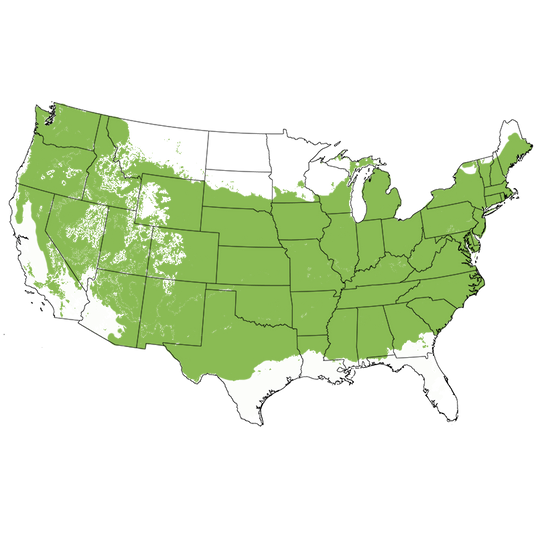
Growing Zones 5-8
The free-flowering Freedom Rose of Sharon (Hibiscus syriacus 'Freedom') is a deciduous shrub with amazing ornamental appeal! Also known as Althea, and related to Hardy Hibiscus and Tropical Hibiscus, Freedom is an old-fashioned favorite in a newer, improved form! Freedom doesn't mind pollution, so can do well even in urban environments! It has no significant pest or disease issues, and overall, Freedom is an easy-to-care-for plant with a hardy, productive nature!
Beginning in summer, and persisting into the fall, Freedom produces luminous pink double-blooms that are large in size and immense in beauty. The lustrous, dark green leaves are the perfect accent for the bright flowers, and help your Freedom maintain a full, vibrant appearance all season long!
It has an upright, spreading nature and can be expected to live up to 40 years (under optimal conditions). It's not fussy about soil types, are xeric once established, and thrives even in poor soils and drought conditions. Growing throughout USDA growing zones 5 to 8, these ornamental deciduous shrubs grow 6 - 8 feet in height and spread to about 4 - 5 feet wide.
Planting and Application:
Plant a Freedom Rose of Sharon as a specimen plant in a front or side yard where you're sure to catch its radiant bloom! One would look lovely by your front steps leading to your entry, or softening the corner of an outbuilding or your home's foundation! Plus, beginner and experienced gardeners can both have the same effect in their gardens!
Space-saving smaller shrubs with late-season color are fantastic for both smaller courtyards and en masse where their low-maintenance nature really shines! Spruce up a cottage garden or perennial border with foliage that sets off every other plant around it! Don't worry about deer, they seldom mess with these plants, however, every bee, butterfly, beneficial insect, and even a few hummingbirds will stop by for the ample nectar and pollen these flouncy blooms hold!
Rose of Sharon are must-have shrubs for the pollinator garden and for low screening around seating areas, the soft and soothing pink flowers add a cool and calming effect to Meditation gardens and sunny hot porches and patios alike!
With a bit of pruning and training, Freedom works great in containers and planters! Balcony and container gardeners can enjoy Freedom anywhere in the sun! Or train them into small, multi-trunked trees by removing the lower branching to expose their trunks. These easy-care shrubs are fantastic gift plants that just exude style!
- Radiant Antique Pink Blooms Summer to Fall
- Dark Green Leathery Foliage
- Upright Vigorous Rounded Form
- Bee & Butterfly Magnets & Hummingbird-Friendly!
- Mid-Sized Hedges, Screening, Accents & Specimens!
#ProPlantTips for Care:
Altheas performs well in almost any soil and even tolerates alkaline and poor soil as long as it is well-drained. Rose of Sharon loves sunshine, so plant it in a spot where they will get at least six hours of sunlight a day. Provide a moderate amount of water on a regular basis, especially for young plants, but once established, Rose of Sharon can be fairly drought resistant. Use a three-inch layer of arborist mulch over the top of the root system to keep them nice and cool.
Blooming on new wood, only Prune Althea in the late winter or early spring to shape or control the height. You'll have flowers later that season, no matter how tightly you trim them in when done at the right time. You can even train these shrubs into multi-stemmed tree forms! Renewal prune every 3-5 years to maintain vigor. Apply a slow-release fertilizer designed for flowering plants in the early spring.
Modern Rose of Sharon actually has reduced seed production, making this plant nearly sterile. Use anywhere in your yard without worrying about nuisance seedlings. In some areas, these seeds can sprout, so Nature Hills employs Plant Sentry™ to ensure these plants won't ship into areas where they can become a problem.
- Full Sun
- Moderate Moisture & Enriched Well-Drained Soil
- Rugged, Cold Hardy & Heat Tolerant
- Vigorous & Very Low Maintenance
- Deer Resistant & Seaside/Salt Tolerant
For a prolific old-fashioned Althea with beautiful flowers from summer through fall, and a hardy nature...look no further than Freedom Rose of Sharon from Nature Hills Nursery today!
Tree Form vs. Shrub Form
The details make all the difference in a garden. At Naturehills.com, we understand that little things like what form a plant is can greatly impact how you plan your landscape. So before you buy, don't forget to check which form you're getting.
Tree Form:
These are plants that have one stem coming from the ground. Plants can also be considered single stem when lower branches are removed to raise the height of the branching to a more desired height. Sometimes, you will hear a tree form referred to as a single stem.
Shrub Form:
These are bushy plants with many stems and branchings close to the ground. They are referred to as shrubs or bushes and are often shorter than their tree forms.




